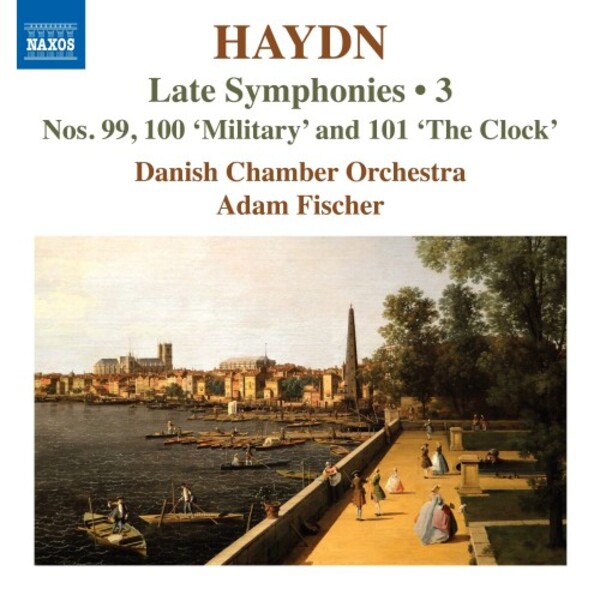HAYDN Symphonies Nos 99-101 (Fischer)
View record and artist detailsRecord and Artist Details
Genre:
Orchestral
Label: Naxos
Magazine Review Date: AW2024
Media Format: CD or Download
Media Runtime: 73
Mastering:
DDD
Catalogue Number: 8 574518

Tracks:
| Composition | Artist Credit |
|---|---|
| Symphony No. 99 |
Joseph Haydn, Composer
Adám Fischer, Conductor Danish Chamber Orchestra |
| Symphony No. 100, 'Military' |
Joseph Haydn, Composer
Adám Fischer, Conductor Danish Chamber Orchestra |
| Symphony No. 101, 'Clock' |
Joseph Haydn, Composer
Adám Fischer, Conductor Danish Chamber Orchestra |
Author: Richard Wigmore
As always with Adám Fischer’s Haydn, there’s much to delight and plenty to argue with here. Trademark Fischerisms abound: tempo manipulations, exaggeratedly prolonged rests (say, in the finale of the Military), rustling, buzzing sul ponticello effects (the accompaniment to the Military’s jaunty second theme evokes a hornets’ nest), plus, in fast movements, a tendency to short bow strokes and clipped phrasing. Reactions will vary sharply. More than once I groaned inwardly. Yet Fischer and his lithe Danish band never take a single phrase for granted, in symphonies whose familiarity can too easily lead conductors into amiable routine. The second movements are specially rewarding. The great Adagio of No 99 flows in long, eloquent spans, with delectable work from flute, oboe and bassoon as they rhapsodise on the main theme – a passage that so enchanted Haydn’s audience in 1794. The Military’s Allegretto is nicely poised between the skittish and the wistful, its Turkish eruptions realistically balanced, while No 101’s timepiece marries delicacy with a roguish twinkle. With antiphonally ricocheting violins and unmuzzled trumpets, the movement’s central G minor outburst yields to few in disruptive violence.
On the whole the fast movements live up to Fischer’s manifesto (in the booklet) that ‘our playing must be powerful, stormy, exciting’, whether in the thrilling build of the development in the Clock’s opening Presto or the comic antics of No 99’s finale, gleefully savoured here. The mercurial finale of the Military opens with an infectious spring before revealing its contrapuntal sinew. Fischer always plays up Haydn’s dramatic contrasts. In the Military’s first movement he gets the flute and oboes to phrase the main theme with an almost finicky daintiness before the brass-fuelled tutti reminds us that no Haydn symphonic movement stakes so much on sheer sonic splendour.
Steeped in the Austrian late 18th-century vernacular, Fischer shrewdly gauges the pacing and spirit of the three contrasting minuets. After the Beethovenian unruliness of No 99’s opening, he suddenly pulls back the tempo and transports us to a Viennese beer garden for an oom-pah demotic waltz (from bar 18). Sly touches of portamento in the Minuet of the Clock conjure the spirit of Johann Strauss. Trios of minuets have always been fair game for a Fischer makeover. Predictably, he opts for solo strings in Nos 99 and 100. I still can’t see why. In the Trio of the Clock the strings’ wheezy sul ponticello and the lurching rhythms evoke a hurdy-gurdy, a common sight and sound in the Vienna of Haydn’s (and for that matter Schubert’s) day. This made me smile on first hearing, less on third – a danger, of course, with all of Fischer’s most extreme ideas.
At moments – not least the high-lying climax of No 99’s opening Vivace (from 7'29") – these symphonies would have gained from an extra desk of violins. But with their period-influenced sonorities the Danish players brilliantly realise Fischer’s conception. If other conductors, including Harnoncourt (Warner, 4/94) and Minkowski (Naïve, 9/10), are more consistently satisfying in these much-recorded symphonies, Fischer constantly challenges preconceptions. His tweaking and tampering can irritate. But crucially, his empathy for Haydn shines out in every bar.
Discover the world's largest classical music catalogue with Presto Music.

Gramophone Digital Club
- Digital Edition
- Digital Archive
- Reviews Database
- Full website access
From £8.75 / month
Subscribe
Gramophone Full Club
- Print Edition
- Digital Edition
- Digital Archive
- Reviews Database
- Full website access
From £11.00 / month
Subscribe
If you are a library, university or other organisation that would be interested in an institutional subscription to Gramophone please click here for further information.




